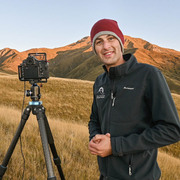Local cyclist's European bike packing adventure
Anna Robb
02 November 2024, 4:45 PM
 Ken Scott at the summit of Col Du Grand Colombier, a mountain pass in the French alps. PHOTO: SUPPLIED
Ken Scott at the summit of Col Du Grand Colombier, a mountain pass in the French alps. PHOTO: SUPPLIEDBiking 8100km and “stealth camping” across Europe for two and a half months solo was a feat of resilience and strength for 68-year-old Ken Scott (Scotty).
Scotty said completing the mission of the European Trail Divide from Norway to Sagres, Portugal was “magic” and evidence to everyone that “you can do more than you think.”
He credits 30 years taking part in multisport and adventure races as helping him to build up endurance.
“I’m not that fast but I can keep going."
When he began in Grense Jakobselv, Norway, he was averaging 180km per day and travelling at about 16km an hour - by the end of the route he had lost a lot of weight and condition and was averaging about 9km an hour.
“On a typical day I’d be up at 5.30am and gone by six-ish, then at about 6pm I’d look for a campsite.”

European Trail Divide Map (EDT). PHOTO: European Divide Trail website

Grense Jakobselv, a small village in Norway, located near the border with Russia where the European Trail Divide begins.
The route was conceived by a well-known bike packer from the United Kingdom, Andy Cox and is 7600km long.
It is made up of sealed and unsealed minor roads, trails, mountain bike single track, farm and 4WD tracks, tunnels, and old forestry roads.
Scotty said he detoured off the route frequently to visit some of the smaller historic villages, some around 800 years old, and stock up on supplies.
“I’m not a foodie… I was living on noodles, pasta, things you can add water to, and pastries.
“I had to be careful with food, I quickly found out things were closed on Sundays.”
Scotty said he never had any trouble with getting water and he carried about two and half litres of water on his bike.
“[EDT] put me in an uncomfortable position, I had to make all decisions on my own, because I was by myself.
“I was constantly thinking about food, and where I was going to get it.”
Along with food, another aspect he had to manage was technology.
“There was a balls up at the start and GPS had me going in the wrong direction . . . I was 70km from where I should have been.”
His strategy was to “make a beeline for a young person,” and many people in the Scandinavian countries spoke English.
“Language did get more difficult, but it was never a major problem and I used google translate.”

One of his freedom campsites in Sweden. PHOTO: SUPPLIED
Scotty said he never felt unsafe although there were stressful moments in countries where free camping is illegal.
In Finland, Norway, Sweden and Denmark free camping was encouraged and there were shelters set up for people to use.

An example of a camp in Denmark. PHOTO: SUPPLIED
“In Lapland and Scandinavia there were mosquitos and reindeer everywhere, trees and lakes.
“In Germany, France, Spain and Portugal there is no free camping . . . I had to stealth camp and find hidden places to pitch my tent at night.
“I’d find somewhere [just off the road], hear dogs going, roll out my sleeping mat and sleep for 30 mins first, to see if it would be an alright place to stay overnight.”

One of the forest hidden spots where Scotty pitched his tent. PHOTO: SUPPLIED
It was a solo adventure for Scotty - he saw only ten other bikers doing the EDT and he “hardly spoke to anybody.”
“It would have been so much better and easier to do it with someone and share the load.”
He replaced two chains, two cassettes and one back tyre, and did not experience one puncture during the trip.
“It was hard to find bike shops…. I had all new gear before I left.”
One piece of kit he did have to buy for his bike once he arrived was a bell.
New Zealand’s road users could learn from European drivers, who were courteous, and respectful towards cyclists although they would overtake vehicles including him, on blind corners, he said.
After Germany the weather was great and Scotty never put his jacket on.
He had one day cycling in Spain over more than 40degC saying that day “completely cooked [him]”.
Spain's siesta schedule was tricky with shops closed just as he would need to buy food, and restaurants not opening for the evening until after he was asleep.
“I was missing out on quality food, especially protein.”
One night an annual festival had Spaniards partying hard, with bands playing and music blasting, so with no chance of sleep, he packed up camp and climbed on his bike and started his day’s riding at 4am.
He said the built environment across Europe including its bridges, viaducts, buildings, villages, castles and other structures were big and grandiose, a huge contrast to other places in the world.
He rode through 300km of non-stop vineyards in Spain, took a detour to avoid notorious wild dogs after tips from other bikepackers, but had in his mind his final destination and a month-long holiday with wife Jane.
A bed and breakfast 50km up the coast from the EDT finish he splurged on buying lunch and dinner, and ate what he said tasted like the most beautiful pastries.
At the cabin, just days before Jane arrived, he said he slept for two days, after a few beers and some well-earned ice cream.

Scotty and wife Jane in Spain. PHOTO: SUPPLIED
The pair enjoyed rest and relaxation in Europe, with a rental car, visiting Spain, Portugal, France and Switzerland after he completed the 8100km bike ride.
The Central App asked Scotty what advice he would give bikepackers considering the EDT and he said they’d need to keep an open mind and look at going off route.
“You need to know it’s countryside not towns, it’s pretty cool . . . Yeah, I’d send people there.”
Have a story you want to share?
Contact [email protected]
NEWS
WHAT'S ON





